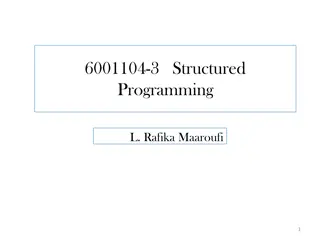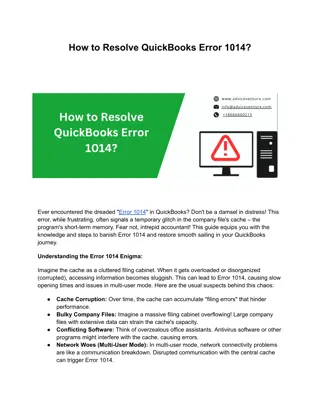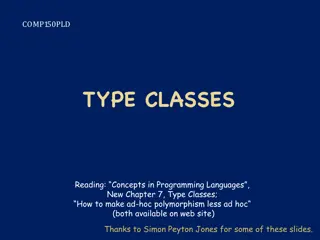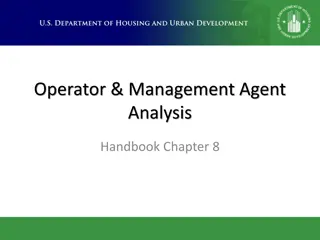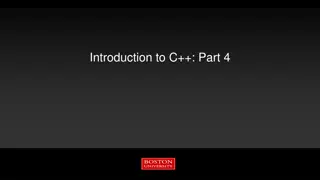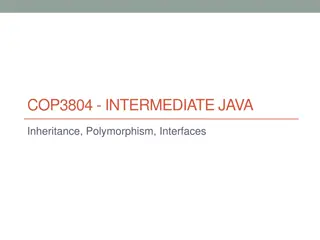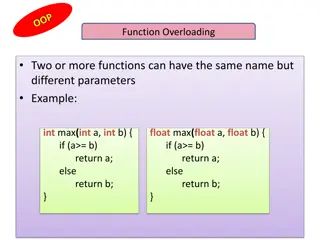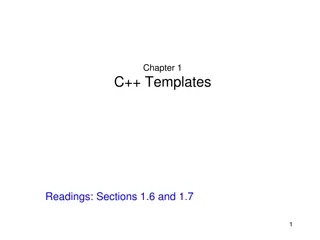Operator Overloading
This chapter introduces operator overloading in Python, where operators can have extended meanings beyond their predefined operations. Examples of operator overloading are provided, showcasing how operators like '+' can be used to perform different tasks depending on the data types involved. The process of overloading operators allows for custom definitions and behaviors to be assigned to operators, enabling more versatile and intuitive programming techniques.
Download Presentation

Please find below an Image/Link to download the presentation.
The content on the website is provided AS IS for your information and personal use only. It may not be sold, licensed, or shared on other websites without obtaining consent from the author.If you encounter any issues during the download, it is possible that the publisher has removed the file from their server.
You are allowed to download the files provided on this website for personal or commercial use, subject to the condition that they are used lawfully. All files are the property of their respective owners.
The content on the website is provided AS IS for your information and personal use only. It may not be sold, licensed, or shared on other websites without obtaining consent from the author.
E N D
Presentation Transcript
Objectives O This chapter introduces 1. Operator overloading Examples of operator overloading 2. 2
Operator Overloading O Operator extended meaning beyond their predefined operational meaning O For example, operator + is used to add two integers as well as join two strings and merge two lists O It is achievable because + operator is overloaded by int class and str class Overloading means giving 3
Operator Overloading # Python program to show use of # + operator for different purposes. print(1 + 2) # 3 # concatenate two strings print("Geeks"+"For") # GeeksFor # Product two numbers print(3 * 4) # 12 # Repeat the String print("Geeks"*4) # GeeksGeeksGeeksGeeks 4
How to overload the operators O Consider that we have two objects which are a physical representation of a class (user- defined data type) and we have to add two objects with binary + operator it throws an error O Because compiler don t know how to add two objects O So we define a method for an operator and that process is called operator overloading 5
How to overload the operators O We can overload all existing operators but we can t create a new operator O To perform operator overloading, python provides some special function or magic function that is automatically invoked when it is associated with that particular operator O For example, when we use + operator, the magic method __add__ is automatically invoked in which the operation for + operator is defined 6
Binary Operators Operator + + * * / / // // % % ** ** >> << & | ^ Magic Method __add__(self, other) __sub__(self, other) __mul__(self, other) __truediv__(self, other) __floordiv__(self, other) __mod__(self, other) __pow__(self, other) __rshift__(self, other) __lshift__(self, other) __and__(self, other) __or__(self, other) __xor__(self, other) 7
Comparison Operators Operator < < > > <= <= >= >= == == != != Magic Method __lt__(self, other) __gt__(self, other) __le__(self, other) __ge__(self, other) __eq__(self, other) __ne__(self, other) 8
Assignment Operators Operator - -= = += += * *= = /= /= //= //= %= %= ** **= = >>= >>= <<= <<= &= &= |= |= ^= ^= Magic Method __isub__(self, other) __iadd__(self, other) __imul__(self, other) __idiv__(self, other) __ifloordiv__(self, other) __imod__(self, other) __ipow__(self, other) __irshift__(self, other) __ilshift__(self, other) __iand__(self, other) __ior__(self, other) __ixor__(self, other) 9
Unary Operators Operator + + ~ ~ Magic Method __neg__(self) __pos__(self) __invert__(self) 10
Overloading binary + operator O When we use an operator on user-defined data types, a special function or magic function associated with that operator is automatically invoked O We can define methods in the class and operators work according to that behavior defined in methods O When we use + operator, the magic method __add__ is automatically invoked in which the operation for + operator is defined O With changing this magic method s code, we can give extra meaning to the + operator. 11
Overloading binary + operator O Whenever we change the behavior of the existing operator overloading, we have to redefine the special function that is invoked automatically when the operator is used with the objects through operator 12
# Python Program illustrate how # to overload an binary + operator # And how it actually works Example class A: def __init__(self, a): self.a = a # adding two objects def __add__(self, o): return self.a + o.a ob1 = A(1) ob2 = A(2) ob3 = A("Geeks") ob4 = A("For") print(ob1 + ob2) print(ob3 + ob4) # Actual working when Binary Operator is used. print(A.__add__(ob1 , ob2)) print(A.__add__(ob3, ob4)) #And can also be Understand as : print(ob1.__add__(ob2)) print(ob3.__add__(ob4)) 13
Another Example # Python Program to perform addition # of two complex numbers using binary # + operator overloading. class complex: def __init__(self, a, b): self.a = a self.b = b # adding two objects def __add__(self, other): return self.a + other.a, self.b + other.b Ob1 = complex(1, 2) Ob2 = complex(2, 3) Ob3 = Ob1 + Ob2 print(Ob3) # (3, 5) 14
Overloading comparison operators # Python program to overload # a comparison operators class A: def __init__(self, a): self.a = a def __gt__(self, other): if(self.a>other.a): return True else: return False ob1 = A(2) ob2 = A(3) if(ob1>ob2): print("ob1 is greater than ob2") else: print("ob2 is greater than ob1") 15
# Python program to overload equality # and less than operators class A: def __init__(self, a): self.a = a def __lt__(self, other): if(self.a<other.a): return "ob1 is less than ob2" else: return "ob2 is less than ob1" def __eq__(self, other): if(self.a == other.a): return "Both are equal" else: return "Not equal" Overloading equality and less than operators ob1 = A(2) ob2 = A(3) print(ob1 < ob2) # ob1 is less than ob2 ob3 = A(4) ob4 = A(4) print(ob1 == ob2) # Not equal 16
O : O https://www.geeksforgeeks.org/operator- overloading-in-python/ O https://stackoverflow.com/questions/31886 66/python-operator-overloading-a-specific- type 17
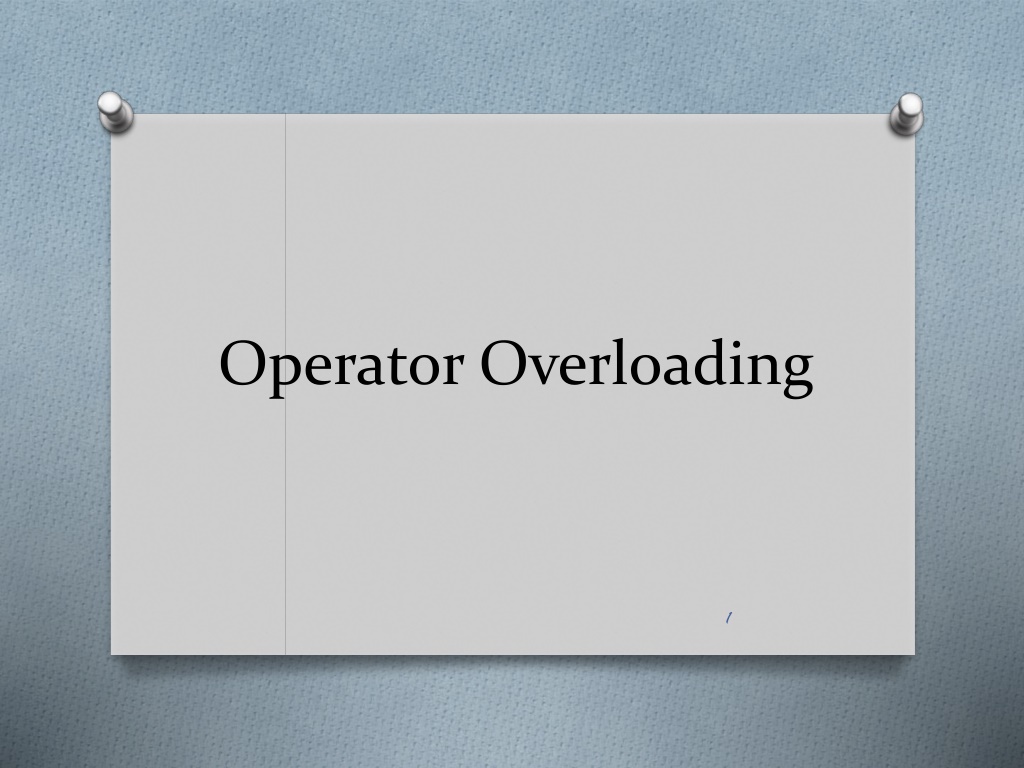
 undefined
undefined















